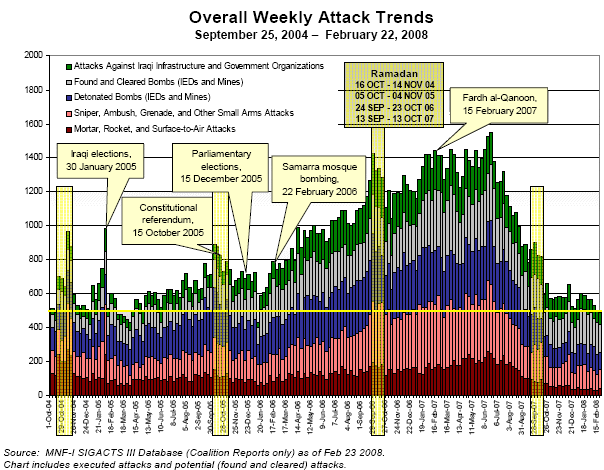Iraq’s latest battle
A.J. Rossmiller…In reality, Maliki (et al, including, it seems, US officials) drastically misjudged his ability to project power in Basra against the Mahdi Militia. As it turns out – and I know you’ll be shocked to hear this – it’s tough to fight an indigenous force that is highly motivated, knowledgeable about the battle terrain (especially in an urban environment), and doesn’t rely on a strict hierarchical command and control structure. Who knew! I don’t know how many times this lesson needs to be learned, but apparently Maliki didn’t even take it from the difficulty the US has had in his own country. For another regional example that I think is a relatively close analogy, compare the Israeli operation in Lebanon last summer – in that case, too, a state-based army drastically underestimated the ability of a militia to defend its own territory in the streets and alleys, leading to a humiliating operation.
…this absolutely was a humiliation for Maliki. Sadr doesn’t appear to be giving up a single thing, and he never wanted an all-out fight (hence the ceasefire in operation since August). Sadr got to test out his fighters, see who was loyal and who was rogue, and then his forces held their own in the battle — and as we all know by now, if you’re attacking and not winning, you’re losing. Then Iran got fed up with the skirmishing in its sphere of influence and told everybody to shut it down … so they did! The agreement to stop major fighting was brokered by Iranians, with Sadrists and members of Maliki’s government essentially undermining him by agreeing to what is essentially a return to the status quo…
The Senate’s three presidential contenders probably won’t be back in Washington when Congress returns Monday from its Easter recess, but they are expected to converge the following week when Gen. David Petraeus gives his much-anticipated report on progress in Iraq. Sen. John McCain (Ariz.) is the top Republican on the Senate Armed Services Committee, which will hear testimony from Petraeus on April 8. Sen. Hillary Rodham Clinton (N.Y.) is one of the Democrats on the panel, which will also hear from U.S. Ambassador to Iraq Ryan Crocker. Clinton’s opponent for the Democratic nomination, front-runner Sen. Barack Obama (Ill.), will not be at that hearing, but he does sit on the Foreign Relations Committee, which will also hear testimony on Iraq that day from Petraeus and Crocker.

 On another note, I had the strangest feeling today. It didn’t last very long. But for a short time, it felt like it was all over – not the War, the Bush/Cheney era. I don’t know exactly what triggered it. I know it scared me to be thinking it because they’ve got eight months to go before the election to do horrible things, and there are plenty of knotty problems coming for the next Administration anyway. But I did feel it. And before I got scared, I felt both relaxed, and confused. They’ve kept me so tied up in their antics, I wonder if I’ll even know how to think after they’re gone. I hope I get another chance to feel it, so I can spend some time getting my bearings. It occurred to me that it was like what the soldiers must feel when they come home – disorienting…
On another note, I had the strangest feeling today. It didn’t last very long. But for a short time, it felt like it was all over – not the War, the Bush/Cheney era. I don’t know exactly what triggered it. I know it scared me to be thinking it because they’ve got eight months to go before the election to do horrible things, and there are plenty of knotty problems coming for the next Administration anyway. But I did feel it. And before I got scared, I felt both relaxed, and confused. They’ve kept me so tied up in their antics, I wonder if I’ll even know how to think after they’re gone. I hope I get another chance to feel it, so I can spend some time getting my bearings. It occurred to me that it was like what the soldiers must feel when they come home – disorienting…
Sorry, the comment form is closed at this time.